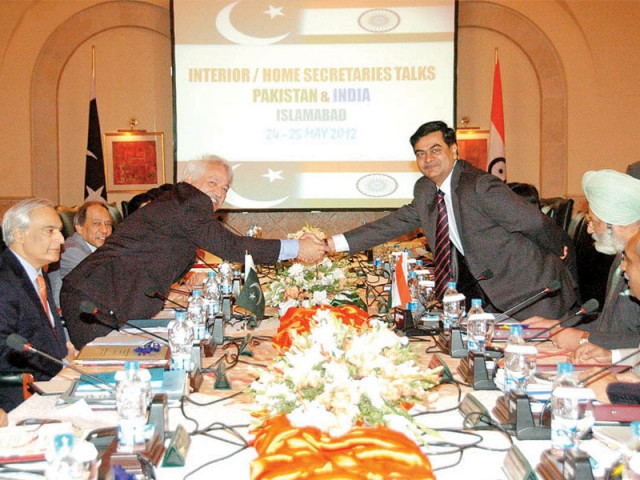Secretary-level talks: Pak, India finalise new visa regime
Joint statement on two-day talks expected today.

Pakistan and India have finalised a new visa regime that seeks to do away with the decades-old strict travel restrictions on cross-border movement of their citizens.
Understanding on the new agreement was reached here on the first day of talks between the neighbouring countries’ interior secretaries, said a Pakistani official.
The negotiations, which have stretched over a year, are part of the ongoing peace process, which has picked up momentum in recent months.
On Thursday, Pakistan’s Interior Secretary Khawaja Siddique Akbar and his Indian counterpart RK Singh discussed issues related to counter-terrorism, exchange of prisoners and the new visa regime.
While the two sides struggled to reach common ground on issues such as the trial of suspects of the 2008 Mumbai attacks and the Samjohta incident, major progress was made on the new visa agreement. The new visa regime, which is expected to be signed today (Friday), will pave way for increased people-to-people contacts between the two countries.
The Indian home ministry said “the revised agreement inter-alia introduces the concept of group tourist visa, visa on arrival and a separate category of business visas.”
The visa will be a major facilitator for businessmen, who have in the past six months been encouraged by the overwhelming response at exhibitions in Lahore and New Delhi.
The arrangement will also be favourable for pilgrims on both sides.
‘Indian concerns’ on trial
As expected, the Indian home secretary voiced concern over what he called “slow progress” in the prosecution of the perpetrators of the Mumbai attacks.
“It seems that the progress in the judicial proceedings against them (persons charged with involvement) is very slow. Many accused persons have not been brought before the courts,” R K Singh told the media before the meeting with his Pakistani counterpart.
He added that India had shared additional evidence with Pakistan linking Jamaatud Dawa chief Hafiz Saeed with the attacks.
The Indian secretary also said that the Mumbai attacks and the Samjhota train tragedy should not be seen in the same context.
Responding to the reservations, Pakistan’s Interior Secretary Siddique Akbar termed the Mumbai trial a “sub judice matter”, saying that Islamabad was discussing all issues with New Delhi with an open mind.
The second round of talks will take place in Bhurban, Murree today, after which the two sides are expected to issue a joint statement.
Published in The Express Tribune, May 25th, 2012.




1724319076-0/Untitled-design-(5)1724319076-0-208x130.webp)














COMMENTS
Comments are moderated and generally will be posted if they are on-topic and not abusive.
For more information, please see our Comments FAQ